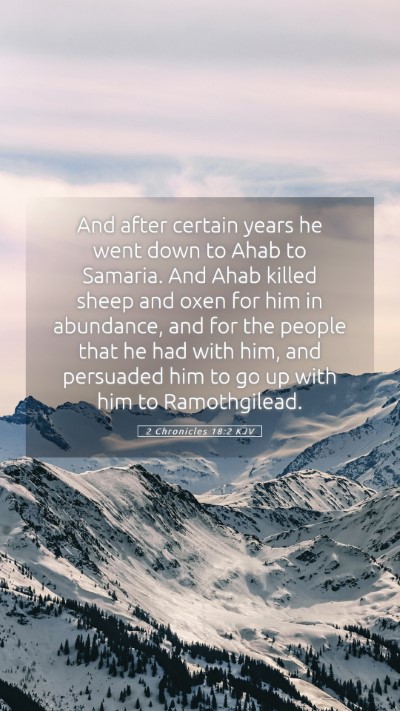Bible Verse Explanation: 2 Chronicles 18:2
Verse Text: "And after certain years he went down to Ahab to Samaria. And Ahab killed sheep and oxen for him in abundance, and for the people that he had with him, and persuaded him to go up with him to Ramothgilead." (2 Chronicles 18:2)
This verse presents an important scene in the narrative of King Jehoshaphat of Judah and King Ahab of Israel. The text reflects political alliances and the motivations that often underlie them. Below is a synthesized commentary from respected public domain scholars to enhance Bible verse understanding.
Meaning of the Verse
The visit of Jehoshaphat to Ahab is significant for several reasons:
- Political Alliances: Jehoshaphat's decision to visit Ahab suggests a desire to strengthen political ties. The ancient world was characterized by such alliances, often made through marriages or treaties.
- Symbolism of Abundance: The abundance of sheep and oxen signifies Ahab’s wealth and perhaps his inclination to be hospitable. This attempt to win over Jehoshaphat displays a common practice among rulers to display generosity to foster alliances.
- Persuasion: The act of persuading Jehoshaphat to join him in battle at Ramothgilead indicates Ahab’s desperation and willingness to engage in conflict. It foreshadows subsequent events that lead to significant spiritual and physical consequences.
Biblical Exegesis
When conducting in-depth Bible verse analysis, one must consider the broader context in which this verse is situated:
- Historical Context: This event occurs during a time of tumult between Israel and surrounding nations, highlighting the political maneuverings of kings to maintain power and security.
- Theological Implications: This alliance also raises questions about the integrity of Jehoshaphat's faith, particularly given Ahab's notorious reputation for idolatry and turning away from Yahweh.
- Consequences of Compromise: Scholars like Matthew Henry often emphasize that alliances with worldly powers can lead believers into paths of compromise, which is a prevalent theme throughout the scriptures.
Bible Verse Commentary
Matthew Henry notes that Jehoshaphat's affinity for Ahab presents a moral dilemma: "He was a good king who allied himself with a wicked king." This points to the importance of righteousness in choosing companionship and alliances.
Albert Barnes emphasizes that Jehoshaphat should have been cautious, stating: "The good king must learn to separate himself from the wicked." This brings to light the spiritual dangers of associating with those who do not uphold the values of the faith.
Adam Clarke suggests practical applications for today’s readers: "It is wise to see the character of those we align with; their inclinations and decisions can affect our spiritual journey." This urges believers to reflect on their relationships and affiliations.
Application of the Verse
The significance of this verse extends beyond its historical context; it serves as a guide to contemporary believers:
- Self-Reflection: Consider the influences in your life. Are they leading you towards righteousness or compromise?
- Friendship and Faith: Evaluate your alliances. Are they affirming your faith and leading you closer to God?
- Spiritual Discernment: Seek wisdom in decisions that involve significant others, ensuring they align with God’s will.
Cross References
This verse can be cross-referenced with the following:
- 1 Kings 22:2-4 - The account of Ahab and Jehoshaphat preparing for battle.
- 2 Chronicles 19:2 - A warning that Jehoshaphat receives about his alliance with Ahab.
- 2 Corinthians 6:14 - A New Testament reference about being unequally yoked with unbelievers.
Conclusion
The account in 2 Chronicles 18:2 provides rich material for Bible study insights, emphasizing the necessity of wise associations and the potential spiritual ramifications of earthly alliances. For those engaging in Bible study groups or online Bible study, this verse offers an excellent foundation for discussions around faithfulness, integrity, and the importance of godly counsel.
For those seeking deeper Bible study tools and guides, consider this verse as part of a larger exploration of the narratives involving the kings of Israel and Judah. Such study can lead to profound understanding of Scripture and personal application in today's context.


